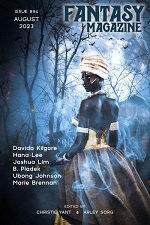“Voices of Kings” by Joshua Lim
“My Dear, My Love” by Davida Kilgore
“The Runners” by B. Pladek
“Bari and the Resurrection Flower” by Hana Lee
Reviewed by Mike Bickerdike
“Voices of Kings” by Joshua Lim is a flash fiction animal fable, bearing close similarity to Kipling’s children’s tales of how animals came to be as they are. Of course, inviting comparison with Kipling is a bold move with a slim chance of success, though it’s a passable read for flash fiction.
“My Dear, My Love” by Davida Kilgore is idiosyncratically written, especially at the start. Indeed, the second and third sentences contain thirteen commas between them—an affectation that doesn’t make it good prose. Indeed, the writing in general strives too overtly for artfulness, being littered with a plethora of similes and metaphors. The tale is of a black woman, Medea—of whom we are given a lengthy, metaphoric picture of each of her features—and her tumultuous married life. Narrated by a female childhood friend who harbours unrequited lesbian love for Medea, the tale recounts moments of life that they share and, ultimately, the fate of Medea’s cheating husband. The fantasy elements of this magical realism story are rather slight, and whether it would have very broad appeal is uncertain.
“The Runners” by B. Pladek—a piece of flash fiction—is rather better. Well composed, this short tale explores the relationship of a couple; the man wishes to have children, while the woman does not. The woman takes up running and on her runs she sees Pan, the god of spring and fertility, who runs past her, providing a nice metaphor for her situation. If her visions of Pan are merely that, then this could be viewed as a non-genre short story, though a perfectly good one.
“Bari and the Resurrection Flower” by Hana Lee is a short story associated with gender identity and as such it is very much ‘of its time’. However, other than meeting the zeitgeist, it doesn’t offer an awful lot to engage the reader. As a non-binary child, Bari was discarded to die in the forests when her parents, the king and queen, saw their newborn baby was not a boy (but not a girl either apparently, as they raised seven girls). Bari survived, however, and the tale picks up when one of Bari’s sisters enters the forest to seek help in saving their poisoned parents. For those with an interest in, or association with, non-binary gender identity this construction may well have appeal. However, it’s perhaps likely to lose those readers with whom it will have little resonance before the story picks up somewhat once Bari travels to the underworld.
More of Mike Bickerdike’s reviews and thoughts on science-fiction can be found at https://starfarersf.nicepage.io/
 Fantasy
Fantasy